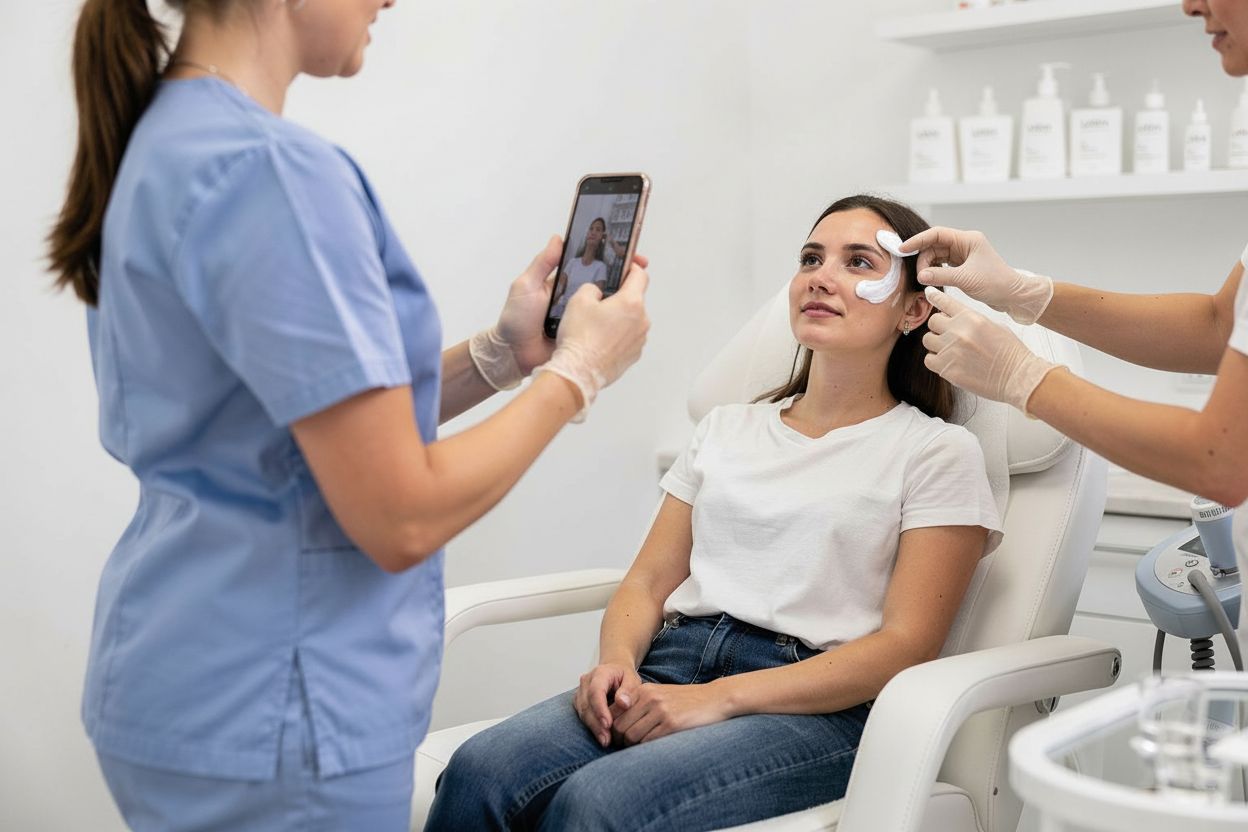Medical Spa Laws and Requirements in Maine

Empowering Professionals at Every Stage
Portrait offers strategic expertise to help you make informed decisions and achieve long-term success.
Book Intro CallUnderstanding medical spa laws in Maine begins with knowing how they are defined: generally as licensed healthcare facilities providing aesthetic treatments under a physician's oversight. Since regulations can be complex, our guide breaks down what you need to know for compliant and successful operation in the state.
How Medical Spa Laws Work in Maine
In Maine, a medical spa is distinguished from a traditional day spa by the services offered; it's a healthcare facility providing non-surgical cosmetic procedures under medical supervision. This distinction is crucial for med spa compliance, as procedures like Botox injections, dermal fillers, and laser treatments are considered medical acts. Unlike day spas, these facilities must adhere to specific medical spa requirements in Maine to ensure patient safety.
The requirement for medical oversight is why med spa regulations are more stringent, focusing on practitioner licensing, informed consent, and emergency preparedness. The primary governing bodies ensuring these standards are met include the Maine Board of Licensure in Medicine and the Maine Department of Health. These agencies set the rules for who can open a med spa and what services they can legally provide, shaping the medical spa laws in Maine.
Medical Spa Requirements in Maine
To meet the medical spa requirements in Maine, you must address several key areas of med spa compliance. While the state's approach to who can own a med spa is more flexible than in many other states, the mandate for a licensed physician as a medical director is absolute. Beyond ownership, you must also secure the correct licenses for your facility and practitioners and follow all med spa regulations for patient safety and operations to run a successful practice.
Medical Spa Ownership & Business Structure Requirements in Maine
Maine's medical spa ownership laws are notably flexible, directly addressing the question of who can own a med spa. Unlike states with strict Corporate Practice of Medicine (CPOM) rules, Maine permits non-physicians—including nurses, estheticians, and other professionals—to own a medical spa. This approach provides more opportunities for a wider range of entrepreneurs interested in opening spas in Maine.
This flexibility extends to business structures, as the state does not mandate a specific entity type like a professional corporation. Because non-physicians can own a facility directly, a Management Services Organization (MSO) is not required, though it remains a viable option for structuring the business. This simplifies one aspect of med spa compliance, allowing you to choose the business entity that best fits your operational model.
However, all medical spas in Maine must operate under the supervision of a designated medical director who is a licensed physician. This individual is responsible for all medical services and ensures the practice adheres to all med spa regulations. While various professionals can own the business, only licensed practitioners may perform procedures within their scope of practice.
Facility, Licensing, and Compliance Requirements in Maine
To open a med spa in Maine, you must secure the proper licenses for your facility and staff. Your medical spa must be licensed by the Maine Board of Licensure in Medicine, and you will also need a general business license from the state. These steps are fundamental to achieving med spa compliance and legally operating spas in Maine.
Operational safety is governed by both state and federal med spa regulations. Your facility must have adequate space for patient care, maintain proper infection control procedures, and establish a written emergency plan. Additionally, you are required to follow federal OSHA safety guidelines and become fully HIPAA compliant to protect your staff and patients.
Beyond facility rules, you must also manage liability, marketing, and patient records correctly. Maine's medical spa laws require you to carry malpractice insurance and follow specific advertising restrictions, such as avoiding misleading claims and disclosing procedural risks. Finally, you must obtain informed consent from all patients and keep these forms on file for at least five years.
Who Can Perform Medical Spa Procedures in Maine?
In Maine, only licensed professionals can perform medical aesthetic procedures, and all services must be overseen by a designated medical director. The allowed practitioners include licensed physicians, registered nurses (RNs), and physician assistants (PAs). While other professionals like estheticians can own a facility, they may only perform services within their specific license, and nurse practitioners (NPs) may require special authorization for certain treatments.
The scope of practice covers non-surgical cosmetic procedures like Botox injections, dermal fillers, laser hair removal, and body contouring. These treatments are considered medical acts that must be performed by a qualified professional operating within their license's scope. This distinction is a core part of the medical spa laws in Maine, separating these facilities from traditional day spas.
A designated medical director who is a licensed physician is a central part of the medical spa requirements in Maine, ensuring proper med spa compliance. While specific supervision levels are not explicitly defined in state regulations, all procedures must be delegated and overseen by this director. For detailed guidance on delegation and training, you should consult the Maine Board of Licensure in Medicine.
Laser & Energy Device Regulations in Maine
Maine's med spa regulations do not provide a specific legal definition for lasers, IPL, or other energy-based devices. Instead, the use of this equipment is governed by the general scope of practice rules for licensed medical professionals. This means that while procedures like laser hair removal are permitted, med spa compliance is tied to the practitioner's license rather than device-specific statutes.
The operation of these devices is restricted to licensed physicians, registered nurses (RNs), and physician assistants (PAs). All procedures must fall within the practitioner's professional scope and be overseen by the facility's designated medical director. The current medical spa laws in Maine do not outline separate training or registration requirements for laser technicians, nor do they specify obligations for reporting adverse events from these treatments.
Medical Spa Enforcement, Penalties & Risk Management in Maine
Violating the medical spa laws in Maine carries significant consequences, as state agencies actively enforce these rules to protect public safety. While med spa laws by state differ, Maine's Board of Licensure in Medicine and Department of Health will take action against non-compliant spas in Maine. Failure to meet the medical spa requirements in Maine can result in severe penalties, including cease-and-desist orders, substantial fines, and disciplinary action against licensed professionals, which may lead to license suspension or revocation.
Staying compliant often means avoiding a few common but critical mistakes. Here are some of the most frequent violations that put practices at risk:
- Improper Delegation: Allowing unlicensed staff to perform medical procedures or failing to provide adequate supervision by the medical director.
- Misleading Advertising: Making unverified claims about treatment outcomes or failing to disclose potential risks, which violates med spa regulations.
- Unlicensed Practice: Offering services outside a practitioner's legal scope of practice or operating without the necessary facility and professional licenses.
A proactive approach to risk management is your best defense. Integrating clear protocols into your daily operations can protect your practice and build patient trust. To maintain med spa compliance, we recommend focusing on these core practices:
- Conduct Regular Audits: Periodically review your procedures, patient files, and documentation to catch and correct potential compliance gaps before they become problems.
- Prioritize Staff Training: Ensure every team member understands their specific scope of practice and your facility's protocols for patient safety and documentation.
- Maintain Meticulous Records: Keep detailed and organized records of patient consents, treatment plans, delegated tasks, and staff credentials. Proper documentation is your first line of defense in an audit.
Stay Compliant with Portrait Care in Maine
Staying compliant in Maine comes down to a few critical pillars: securing a licensed physician as your medical director, ensuring all procedures are performed by qualified practitioners, and maintaining meticulous records. While Maine offers flexibility in ownership, the rules for patient safety and professional conduct are firm. By focusing on proper delegation, transparent advertising, and thorough documentation, you build a foundation of trust and operational integrity for your practice.
Please note that this guide is for informational purposes only and does not constitute legal advice. We strongly recommend consulting with a qualified healthcare attorney to address your specific circumstances and ensure full compliance.
Our platform provides the tools and resources you need to run a compliant and safe business. Learn more about opening a compliant med spa and discover how Portrait Care can support your practice. Schedule a demo today to see how our all-in-one platform helps top medical wellness clinics run smarter and grow faster.
One Platform.
Everything You Need.
Everything You Need.
Portrait combines the technology, support, and savings to run and scale your modern medical wellness business.
Book Intro Call
Stay Connected with Portrait Care
Subscribe to our email list and receive the latest insights, updates, and exclusive content delivered straight to your inbox.




![Who Can Own a Medical Spa? [State by State Guide]](https://cdn.prod.website-files.com/67981e0672f9e49c5b9cb890/69869b11472946b6ec9fe1f0_1770427418079.jpeg)
